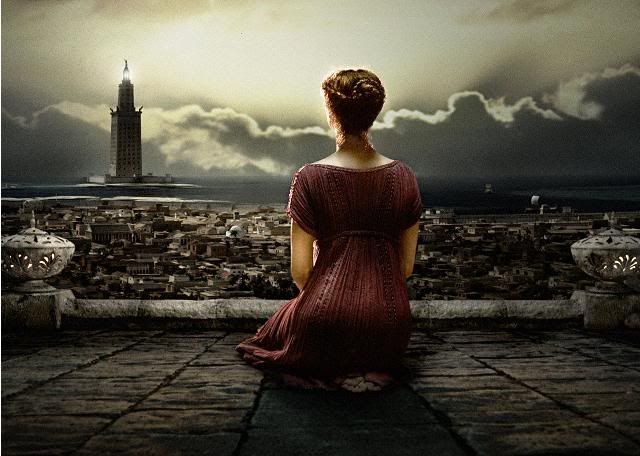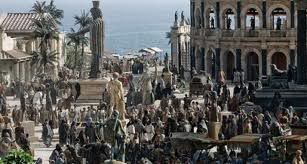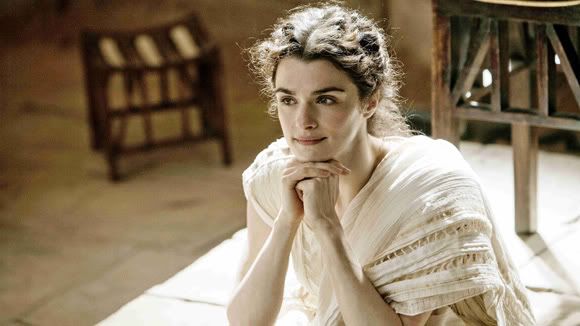
Hello, what's this? A feature film about ... Hypatia of Alexandria! A historical figure no one except classicists have heard of. You can't say the producers of Agora were playing it safe.
Hypatia was a rare example of a woman philosopher, scientist, and teacher who was respected in a man's world. But the time in which she lived was unsettled and dangerous: the Roman Empire in the West was crumbling and pagan religion, even science itself, was suspect to the Christianity that had become the new orthodoxy.
Although she was an important figure in her day, not much direct evidence about her has survived. Most of what we know, or believe, about her was written long after she passed from the scene. Probably most of her own letters and other writing were suppressed by the Christian church.
Although she was an important figure in her day, not much direct evidence about her has survived. Most of what we know, or believe, about her was written long after she passed from the scene. Probably most of her own letters and other writing were suppressed by the Christian church.
The movie tries hard to show us the cultural and religious background of Alexandria in the late 4th century, since without them neither the glory nor the tragedy of Hypatia would be comprehensible. But historical eras, except maybe for the 18th and 19th centuries, are tough for the cinema to re-create realistically.
It's not so much the settings and costumes that are the snag -- given a decent budget (which the makers of Agora seem to have enjoyed), designers can do wonders. Agora's sets, both interior and exterior, are a satisfying imaginative visualization, sometimes downright dazzling. (The DVD includes "making of" extras showing the set design, planning and construction, the costume design, the music scoring -- not particularly unusual, but emotionally effective -- and other impressive work that went on behind the scenes.) Modern computerized effects have added a new dimension to realistic depiction of the past.
But showing how people and places looked is only half the job, and maybe the easier part. "The past is another country, they do things differently there" -- and not only that, they think differently. Their mental world is not ours. That's one reason why, except for a few "spectacles" such as '50s movies like Knights of the Round Table, there have been few set in the Middle Ages. We can identify with their politics and wars to some degree, but the theocentric side of medieval life, the role of faith, is incomprehensible to most of today's moviegoers. The same could be said of the religion of Serapis, apparently the dominant god in pre-Christian Alexandria. One of the most imposing buildings in the movie is the Serapeum, where the great Library of Alexandria was housed at the time.
It's not surprising that Agora presents Hypatia mainly as an astronomer or cosmological theoretician, obsessed with solving the contradictions she finds in the systems of Ptolemy and Aristarchus. The director and co-scriptwriter, Alejandro Amenabar, can't relate to pagan thought, or he believes the audience can't. So the poignancy of the waning of the classical world in which Hypatia was at home is almost entirely missing. She is characterized as an academic, or at best a researcher, not the keeper of an ancient flame.
In a speech given in 1915, Mangasar Magurditch Mangasarian described "The Martyrdom of Hypatia (or the Death of the Classical World)," romanticized and apparently with an anti-Christian bias, but worth reading for its color:
Theodosius was at the time, of which we will now speak, the Christian ruler of the Empire. In reply to a request by the Archbishop of Alexandria, he sent a sentence of destruction against the ancient religion of Egypt. Both the Pagans and the Christians had assembled in the public square to hear the reading of the Emperor's letter, and when the Christians learned that they may destroy the gods of the Pagans, a wild shout of joy rent the air.
The disappointed Pagans, on the other hand, realizing the danger of their position, silently slipped into their homes through dark alleys and hidden passage-ways. Yet they did not stand aside and see the temples of their gods razed to the ground without first offering a desperate resistance. Under the leadership of a zealot, Olympus, the Pagans fell upon the Christians, maddened with the cry in their ears of their leader, "Let us die with our gods!"
Then came the turn of the Christians. Theophilius, the Archbishop of Alexandria, with a cross in his hand, and followed by his monks, marched upon the temple of Serapis, and proceeded to pull its pillars down. When they came to strike at the colossal statue of the god, for centuries worshiped as a deity, even the Christians turned pale with superstitious awe, and held their breath. A soldier armed with a heavy axe, was hesitating to strike the first blow. Will the god tolerate the insult? Will he not crash the roof upon the heads of the sacrilegious vandals?
But the soldier struck the thundering blow right in the cheeks of Serapis, who offered no remonstrance whatever. The sun shone as usual, and the laws of nature maintained their even pace. Encouraged by this indifference of the god to defend himself, the Christian rabble rushed upon the statue, and pulling Serapis off his seat, dragged him in pieces through the streets of Alexandria that the Pagans might behold the disgrace into which their great god had fallen.
Thousands of Pagans, seeing how helpless their gods were to avenge this insult, deserted Paganism and joined the Christians. As soon as the ground of the temple was sufficiently cleared, a church was erected on the ancient site. The Alexandrian library was the next point of attack. Its shelves were soon cleared, and you and I, and twenty centuries, were most lamentably deprived of the intellectual treasures which our Greek and Roman forefathers had bequeathed unto us.
Amenabar is hard on the Alexandrian Christians too, presenting them as raving fanatics. Same with the Jews. And Greek civilization, which would still have been strong in Alexandria centuries after Cleopatra's line ended -- things changed far more slowly in the ancient world than we are used to -- obviously means nothing to him.
None of the characters gives any meaningful account of their beliefs, so all we see of Alexandria is a wrangle among groups in a multi-culti city. Lots of shouting and thrusting of fists in the air and charging one another and knifing and stoning, action without drama because it has no intrinsic significance. The storyline rests on Hypatia's former students turning Christian in various capacities, with enthusiasm and doubts, but their relationships to Hypatia are strictly emotional. This is a film about spiritual and philosophical clash with no spirituality or philosophy.
Agora is under-cast, most of the actors not very good or given nothing in the script to bite into. Other than intermittently, they are dull.
Nothing of the sort can be said about Rachel Weisz as Hypatia, mesmerizing with inward luminosity and intellectual searching. If anyone can bring to life the spirit of Hypatia, she can, and does.









4 comments:
It may have its flaws but at least it is a portion of Western History that's being examined and celebrated.
So much of our history has been destroyed by the hate-whitey movement and the multi-cult, that I am glad when any attention at all is paid to the glorious multi-century story of our Western people.
Maria,
Agreed; it's encouraging when any serious film shows the roots of our civilization in antiquity. Even if Agora falls short in some ways, I respect its ambition.
I had a post up on my blog recently about a Daily Mail article on the recovery of an ancient Roman statue from the Mediterranean at Ceasaria.
It was encouraging to read the comments below it, with people who were clearly awed by an artifact of our Western heritage.
If you're interested in the real life of Hypatia, a good place to start is at Michael Flynn's LiveJournal blog. He has written a 16 part analysis of what Old Alexandria was like, and and what is really known about the life and death of Hypatia. The series starts here and contains a listing of the ancient sources that he consulted.
Post a Comment